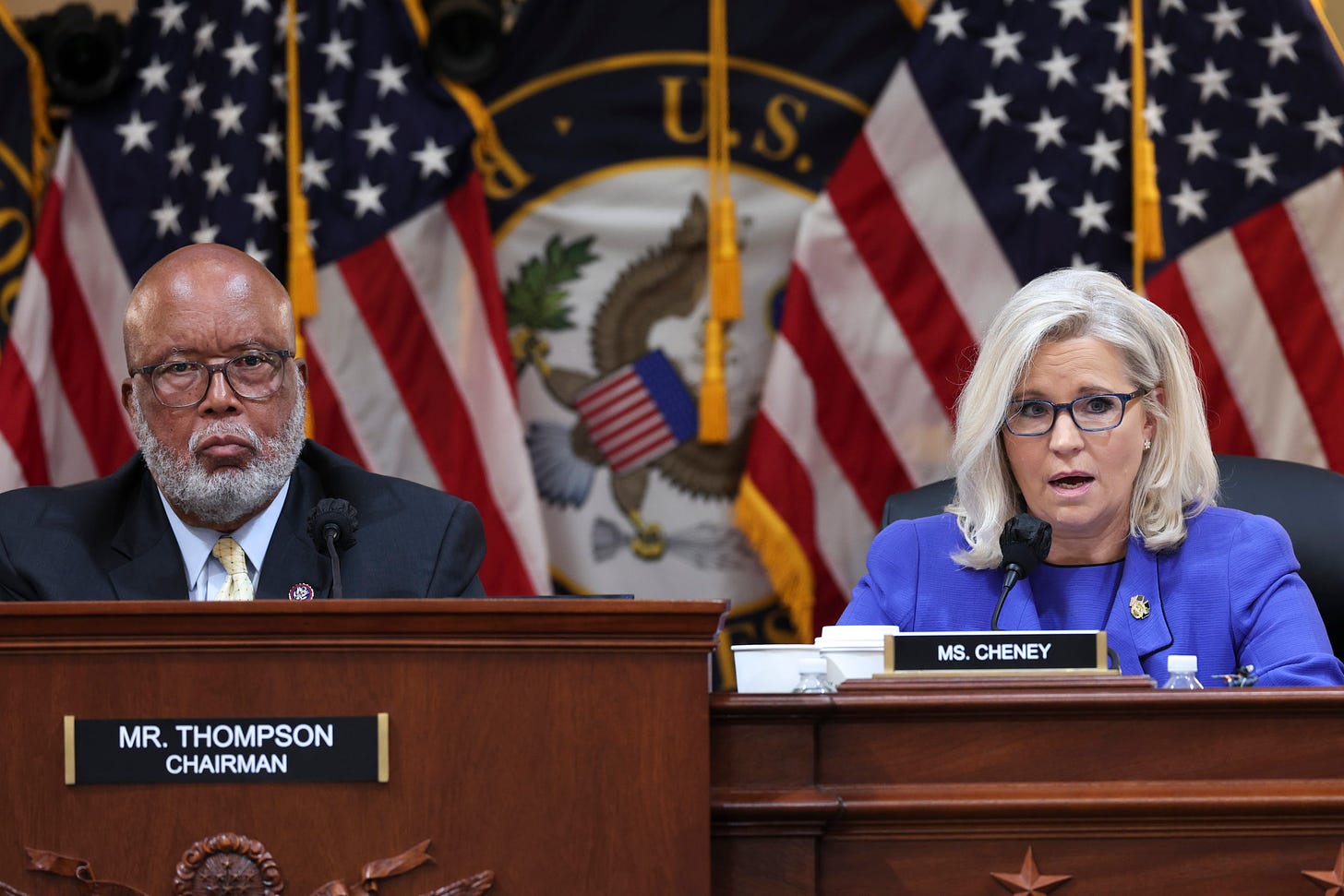What Bennie Thompson and Liz Cheney Have in Common
Both have bucked their party. But the parties responded very differently.

Bennie Thompson and Liz Cheney may be the most unlikely odd-couple American politics has seen in a generation. Thompson, the chairman of the January 6th Committee, is a Democrat from Mississippi who began his career as a school teacher. Cheney, his co-chair, is a Wyoming Republican born into politics. It is instructive that while they could not be more different, they have worked together to make the committee a serious and important undertaking.
It is also instructive to look at how differently the two members have been treated by their parties.
The Republican party’s ostracization of Cheney is familiar: she was stripped of her leadership role for criticizing Trump; the Wyoming GOP no longer recognizes her as a member; and she is facing a likely defeat in her congressional primary to a challenger backed by the entire Republican establishment. Such is the cost of bucking the party in Republican politics, even when it is done in defense of democracy.
But Thompson has also recently bucked his party. Two months after Democrats won the White House and Congress, Thompson was the sole member of his party to vote against H.R. 1, the For the People Act—the measure that was the Democrats’ top legislative priority and that Nancy Pelosi deemed necessary “to restore our democracy.” Thompson claimed that he was putting the wishes of his constituents first, telling Fox News(!) that they “opposed the redistricting portion of the bill as well as the section on public finances.”
Thompson’s vote did not put the measure in jeopardy—it passed the House 220-210 before being filibustered in the Senate. But note the space Thompson was given to disagree with his colleagues on an important measure and the grace he was extended after having done so. Instead of being excoriated, as Cheney was, for not being a team player, Thompson was named chair of a singularly important committee despite it.
There is, perhaps, no other feature as distinguishing between the two parties today than this: Democrats have a far higher tolerance for intraparty disagreements than Republicans, who often seem more interested in punishing dissenters within their own ranks.
The Democratic party is not perfectly respectful of dissent—see the ongoing frustration with Senators Joe Manchin and Kyrsten Sinema. And the Republican party is not completely autocratic—there is still a corner roped off for Senators Susan Collins and Mitt Romney. (For now.)
But the difference is stark nonetheless. Look at how the GOP caucus erupted in anger and recriminations at the 13 Republicans who voted for the 2021 infrastructure bill. It’s not a difference in scale but in kind.
Some view Democrats’ inability to be as unified as the current iteration of the Republican party as a serious liability. On every major issue, Biden’s pragmatic wing runs headlong into the more progressive wing. And while this in-fighting might not be good for the Democrats’ electoral prospects, this sort of deliberation is extremely healthy for liberal democracies. A Democratic party that behaved like today’s GOP—suppressing internal dissent and threatening the electoral death penalty for anyone who doesn’t hold the line—would spell sure doom for our democracy.
Thompson’s vote against H.R. 1 calls attention to a debate that those who believe in democracy and fairness should be thrilled to have. Consider his position on redistricting: there is no universal agreement among black legislators about the best approach. Some prefer enlisting independent commissions to determine congressional districts. Others would rather leave majority-black districts as they are to ensure black legislators get a seat at the table. There are advantages, and disadvantages, to both.
For example, if a metro area forms three congressional districts and is 40 percent black, is it better to pack those voters into a single district and almost guarantee a black representative in Congress? Or is it better to split those voters among two or three districts and increase the chances that the black electorate becomes the swing constituency? Which path provides the best shot for those voters having their policy demands heeded: Having a guaranteed member of their community in Congress, or ensuring that the only way to win the seat is to win the black vote?
Reasonable people can, and will, disagree. Democracy is best served when legislators have this discussion rather than having dissent suppressed or punished.
Thompson’s freedom to vote against his party’s wishes without penalty is characteristic of a functioning democratic process. That display of integrity in difficult circumstances is something that he and Cheney share, and it’s why the pair is perfectly suited for the solemn committee work before them. It’s also a reminder that the biggest difference in today’s politics is not left versus right, but liberal versus illiberal.
Conservatives and progressives must work together; it’s the only way the American experiment works.










